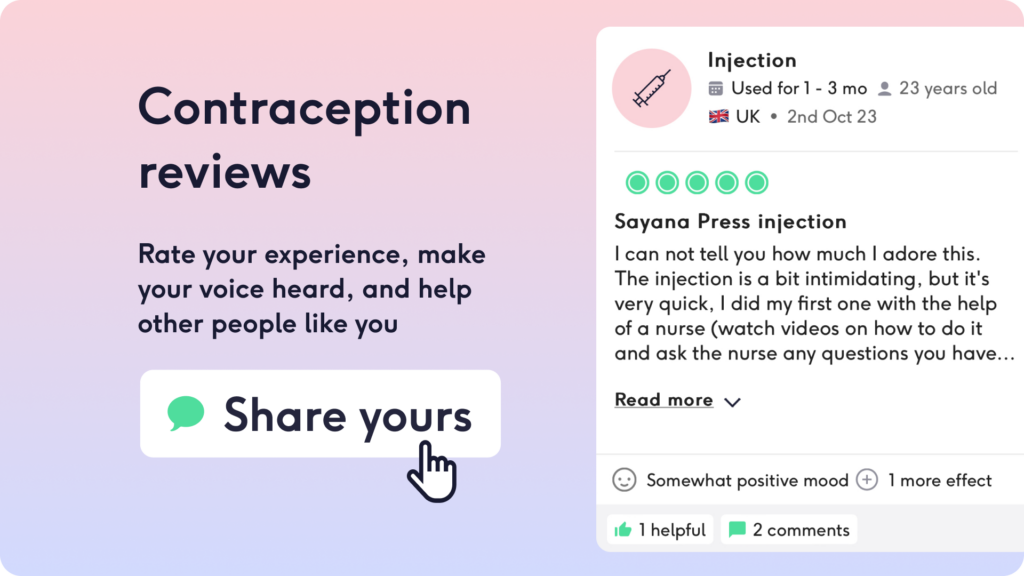Do antibiotics affect contraception?
In this article
What's the lowdown?
Most (but not all) antibiotics are non-enzyme-inducing which means your contraceptive pill will continue to work just fine
But… some can cause vomiting or diarrhoea which you might also experience due to the illness itself – this can affect the absorption of your pill
Enzyme inducing antibiotics such as rifampicin or rifabutin can make some forms of contraception including the pill less effective
Before starting a new medicine ask the health professional that prescribed it whether it will impact upon your pill
In the rare case you are prescribed an enzyme inducing antibiotic, to make sure you’re protected you could switch to an IUD, IUS or the injection – or temporarily use barrier methods such as condoms
Once you have completed your course of these antibiotics, you must continue to use an alternative contraceptive method for 28 days
Contraception and antibiotics are both common, I imagine almost every one of you have used either one, or the other, or both at some point their lives. But what happens when the pill, implant or injection and antibiotics interact? Let’s take a look at the effects of the antibiotics and birth control.
The routine nature of contraception means taking a daily pill can be a well-versed habit and we’re literally meant to forget about contraception after implant or coil fittings. So much so that, if we find ourselves needing other medication, we often don’t even think of contraceptives as medications we are already taking. But it’s important to remember that just like any other drug, over the counter or prescription, there are always possibilities of interactions. Antibiotics are no exception and an unplanned pregnancy as a side effect is possibly one we’d rather avoid! So, it’s important to be clued up on the facts about antibiotics and birth control, and most importantly, the effects they can have on birth controls’ ability to prevent pregnancy.
What are antibiotics and why are they prescribed?
Antibiotics are used in the treatment of bacterial infections. Generally speaking, they are prescribed for infections in patients where symptoms are unlikely to improve on their own, or where there is a risk of infecting others. Antibiotics are not used to treat viral infections as they don’t kill viruses. Antibiotics can be prescribed for many common conditions; persistent UTIs, acne, sore throats can all require their use. They can also be used as a preventative step where there is a future risk of infection. This can include certain types of surgery, such as the removal of the appendix or breast implant surgery, or a bite or wound that has a high chance of becoming infected. Less common illnesses, such as tuberculosis, will also use antibiotics in prevention and treatment, alongside common STIs like chlamydia.
Do antibiotics affect the contraceptive pill?
This isn’t so simple. There are many types of antibiotics which work in different ways. Depending on how the type of antibiotic works, it may or may not affect your contraceptive.
Some antibiotics are known as “enzyme inducing” antibiotics. Enzymes are proteins in our body that facilitate the chemical reactions needed for processes like metabolism and digestion. Enzyme inducing medications or drugs, speed up the reactions controlled by some enzymes in the body. One of the reactions which can be sped up, is the metabolism and breakdown of hormones like progestogen and oestrogen. Due to this increased metabolism and breakdown, the amount of oestrogen and progestogen within your bloodstream reduces so the effectivness of your contraceptive will be reduced. If you’re not aware of this interaction and don’t discuss your contraception, you could be at risk of an unplanned pregnancy.
Which antibiotics affect the contraceptive pill?
The antibiotics which affect the contraceptive pill are:
- Rifampicin
- Rifabutin
Other medications which are enzyme inducers and can reduce the effectiveness of your contraceptive include:
- Carbamazepine (Tegretol)
- Phenytoin
- Some HIV medications
- Topiramate
- St John’s Wort
Does pencillin or amoxicillin affect contraception?
No, as penicillin and amoxicillin are not “enzyme inducing” antibiotics, they do not affect your contraception and you will still be protected from pregnancy while you take these.
The good news is most antibiotics commonly prescribed are non-enzyme-inducing, and your birth control pill will continue to work just fine. Phew!
It is worth noting, however, that while these antibiotics may not directly impact the efficacy of the pill, other side effects may create issues. Antibiotics of any type can cause vomiting or severe diarrhoea. You may also be experiencing these symptoms due to the illness itself. If this happens, and you are sick within 2 hours of taking the pill, absorption of the contraceptive pill may be affected and it will be necessary to take another pill right away.
Sickness or diarrhoea lasting more than 24 hours will impact the level of protection against pregnancy and it is important to remember the validity of the pill as a contraceptive cannot be guaranteed. Each day of sickness or diarrhoea should be counted as a missed pill day. If possible, try to continue to take your pills as normal and use condoms as an extra form of contraception. Whether you’re taking antibiotics or not, this information is important to remember. Vomiting with any cause can impact the absorption of the pill!
Do antibiotics affect the mini-pill?
The progestogen-only pill, or mini-pill, will be affected in the same way as the combined pill, as will the patch and vaginal ring. Rifampicin or rifabutin – enzyme inducing antibiotics – will compromise the efficacy of the mini-pill due to the increase in the metabolism of the progestogen. All other antibiotics (non enzyme inducing) will not affect the mini-pill.
Do antibiotics affect the implant?
Enzyme inducing antibotics and medications reduce the effect of the implant, so you’re advised to choose a different form of contraceptive while taking these medications. However, other antibiotics including penicillin, amoxicillin, clarithromycin (and most other common antibiotics) are safe to use with the implant.
Do antibiotics affect the hormonal coil?
No, antibiotics do not affect the hormonal coil. Even if you are taking enzyme inducing antibiotics or medication, the hormonal coil still works to prevent pregnancy.
Do antibotics affect the injection?
No, antibiotics or enzyme inducing medications do not affect the injection and it will still be effective at preventing pregnancy while using them.
Do antibiotics affect the morning after pill?
Enough research hasn’t been done to understand whether the morning after pill is affected by enzyme inducing antibiotics or medications. The Faculty of Sexual and Reproductive Health advise that the effectiveness of both types of morning after pill could be reduced with enzyme inducing drugs (including Rifampicin and Rifabutin) and so the copper coil should be the first option as emergency contraception.
So, my antibiotics are affecting my pill. What should I do?
First off, don’t panic; there are multiple options available. Depending on personal preference and duration of the course of antibiotics, there are several choices. The progestogen-only injection, intrauterine system (IUS / hormonal coil), and an intrauterine device (IUD / copper coil) are all unaffected by enzyme inducing antibiotics or enzyme inducing drugs. You can switch to one of these methods temporarily, or you may wish to make a change on a more permanent basis.
The Lowdown’s recommender quiz and contraception reviews are a great way to assess these alternatives and make an informed decision. With options to search for reviews based on side effects, both positive and negative, it’s an excellent way to access real-world responses to a variety of contraceptives. You can also find out more about switching contraception in this guide. Condoms are also an alternative that can be used alongside the pill. If you wish to continue using your current hormonal contraception and the course of antibiotics is less than 2 months, it is important to discuss this with your doctor. You may be advised to take the pill in a different way, whilst also using condoms.
How long do enzyme inducing antibiotics affect the birth control pill?
Once you have completed the course of enzyme inducing antibiotics, you must continue to use an alternative contraceptive method for 28 days. You may wish to switch back to your previous method, but be sure to continue with a method unaffected by antibiotics for those full 4 weeks before doing so, and check that you switch safely to remain protected from pregnancy.
Can you take the morning-after pill while on antibiotics?
The emergency contraceptive pills Levonelle and ellaOne both work to prevent pregnancy by stopping or delaying ovulation, the process in which an egg is released from the ovaries. If you’re taking commonly used antibiotics like penicillin or amoxicillin, the morning-after pills will work just fine.
However, there’s hasn’t been enough research to understand whether the morning after pill is affected by enzyme inducing antibiotics or medications. The Faculty of Sexual and Reproductive Health advise that the effectiveness of both types of morning after pill could be reduced with enzyme inducing drugs (including rifampicin and rifabutin) so it’s not recommended that you use the morning after pill if you are taking rifabutin or rifampicin, due to the impact on its ability to prevent pregnancy.
There is, however, an alternative to the morning-after pill. An intrauterine device (IUD), known as the copper coil, can be used as a form of emergency contraception. This has no interaction with antibiotics and the copper coil is actually more effective than emergency contraceptive pills, with less than 1% of women becoming pregnant after using the copper coil.
One last thing about antibiotics and the birth control pill
Enzyme inducing antibiotics are not commonly prescribed. They are used in the treatment and prevention of tuberculosis and meningitis. Most antibiotics used for common conditions, such as chest infections or UTIs, will be non enzyme inducing and will therefore have no bearing on the efficacy of your contraception. Patient Information Leaflets (PIL) can be contradictory with their advice and may relay information that is outdated in regards to this issue. So, it’s important to remember which antibiotics will affect your birth control and the options available to you. If you are ever in doubt, speak with your doctor or pharmacist.

Our medical review process
This article has been medically reviewed for factual and up to date information by a Lowdown doctor.


